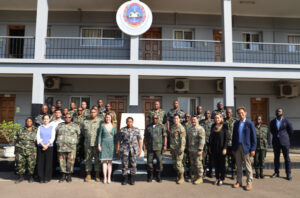
Courtesy Story
Special Operations Command Africa
Maputo, Mozambique – U.S. Special Operations Forces Africa (SOCAFRICA) conducted a medical knowledge exchange focusing on mental health with the Mozambican forces in Maputo, Mozambique, August 26-29, 2024. This event represented SOCAFRICA’s first mental health engagement hosted with the Mozambican forces.
Over the four-day engagement, nearly 20 officers from the Mozambican forces participated in the U.S.-Mozambican Mil-to-Mil Medical Knowledge Exchange Workshop, showcasing an array of topics to include mental health, stress, sleep management and trauma. The U.S. Special Operations Forces lecturers engaged in dialogue with the Mozambican partners on the critical role mental and holistic health play to support partner force mission readiness.
“The aim of the workshop is to provide participants with the knowledge they need to face the challenges related to the health support of forces in operational missions, with emphasis on the planning of operations, psychological support of deployed forces and respect of communities,” said Commodore Sidonia Massangaie of the Mozambique Defence Armed Forces in opening remarks.
The workshop focused on facilitating bilateral exchanges to research, educate and implement contemporary strategies for planning expeditionary medical operations in support of counter violent extremism activities. Leveraging a whole-of-government approach is essential to promoting the health and vitality of the partner forces.
The U.S. has prioritized its partnership with Mozambique to advance the interagency Strategy to Prevent Conflict and Promote Stability. The U.S. Agency for International Development, the Joint Special Operations University, and the U.S. Embassy’s Office of Security Cooperation served an instrumental role in facilitating the planning for the knowledge exchange workshop alongside SOCAFRICA.
“Mental health plays a vital role in keeping our forces fit and ready to do their jobs. When you have a fit force, they are more capable of performing well,” said U.S. Air Force Lt. Col. Holly Hunter, Joint Special Operations Task Force – Somalia psychologist. “Hearing the Mozambicans’ perspectives on mental health has been very beneficial to the team here. The relationship building, the camaraderie and the esprit de corps is hopefully something we can foster between the partner countries and militaries.”
The assembled teams also incorporated a tabletop exercise into the workshop that tested how they would respond to several concurrent high-stress situations. The Mozambican partners then presented their planning procedures and responses to the group for collective feedback.
“Going through the final tabletop exercise with our Mozambican partners gave us a sense of their strategic and operational thinking. They did a fantastic job integrating the content we exchanged during the week,” said U.S. Air Force Lt. Col. Jared Bueche, JSOTF-SOM physical therapist. “This engagement has laid the groundwork for future collaborations to pursue with further real time applications alongside our partners.”
The workshop in Mozambique ran concurrently with a six-week Joint Combined Exchange Training with the Mozambican forces. These exchanges demonstrate the versatility in the U.S.-Mozambique relationship to not only refine tactical operational skills but also to address the mental health needs of Mozambican forces to better assist their counterterrorism efforts.
“Hosting both the JCET and medical exchange workshop with our Mozambican military partners highlights our expanding partnership, which uses a holistic approach to advance peace and security in Mozambique,” said Lt. Col. Louis Cascino, senior defense official and defense attaché at the U.S. Embassy in Mozambique. “We look forward to continued engagement in the future to boost the resiliency of both forces.”
U.S. Special Operations Command Africa engages in a diverse set of activities across the continent to strengthen ongoing partnerships while cooperatively enhancing the security environment. Our partnerships across Africa reinforce relationships, interoperability, and dedication to uphold international values of human rights, representative government, and global prosperity.